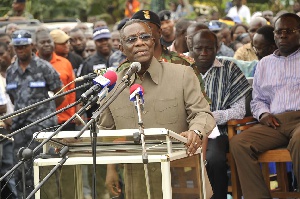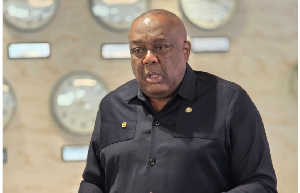By Kwame Okoampa-Ahoofe, Jr., Ph.D.
As a veteran educator himself, one expected that President John Evans Atta-Mills’ 2010 State of the Nation Address would have auspiciously fore-grounded education as indubitably the most significant aspect of our national existence. Unfortunately, this signal sector of our political economy was relegated to Number Ten, or so, on the President’s priority list, and then only to be superficially and hastily dispatched in three of four sentences.
One thing, though, became predictably clear – even as he vigorously insisted to the contrary – that with President John Evans [Oguaa Kofi] Atta-Mills, it is absolutely untrue that “Not everything is political,” as he wanted to have his audience believe. And also that it is not necessarily true that: “The challenges that [Ghanaians] face are [, indeed,] challenges [that transcend individual political parties and even the ruling Government] ‘of the day’ itself.’” For needless to say, the former tax wonk of the Legon law faculty demonstrated himself to be, perhaps, the most politically devious human animal on the Ghanaian geopolitical landscape.
And neither did President Mills appear to have much that was substantive by way of creatively thought-out policy to relate to the longsuffering and overtly disaffected Ghanaian teacher. For instance, on the much-touted campaign question of free school-uniform distribution, we learned that the President’s home-region, that is the Central Region, was the very first to benefit from his shamelessly populist attempt at “social welfarism,” with the other remaining regions of the country having to wait on line until the dying months and weeks of 2010.
This brazen deployment of “tactical nepotism” is, of course, geared towards sealing the electoral support of his kinsmen and women. For as his tendentious “domestic mantra” had it in the heated run-up to the second-round of the 2008 presidential election, “Adepa Ba Ofie a Eye,” loosely translated as “Charity begins at home” or “Blood is thicker than water.”
But that the entire State of the Nation Address was unmistakably predicated on political expediency becomes evident when one critically examines that section of the address devoted to “Members of Parliament.” Here, not unlike the nepotistic prioritization of the Central Region in the distribution of free uniforms to public school pupils, President Mills announced that special office buildings will be constructed for each and every one of the 230 Members of Parliament in their home districts. And what is even more “petro-chemically” striking, each office will also be manned/womanned by a central-government salaried administrative assistant of the concerned MP’s own choosing.
What really makes this arrangement politically expedient is that this time around, funding for the program “will begin [from] constituencies [strategically determined to be] farthest away [removed?] from the national capital – and will proceed progressively until all the 230 constituencies are covered.”
Needless to say, nobody needs a college degree to readily figure out that, once again, in deciding to initiate this patently wasteful program from the three Northern Regions where, incidentally, the ruling National Democratic Congress (NDC) maintains its most commanding electoral support, this sneaky act of psychological gamesmanship is certain to guarantee that the NDC maintains its electoral stranglehold in the foreseeable future. Even more significantly, is the fact that the President is slyly and tactically noncommittal about the temporal span within which he anticipates the program to reach its completion. Needless to say, this politically determined deployment of public funds ought to make the presidential frontrunners of the opposition New Patriotic Party (NPP) to either sit up widely awake in their chairs and wisely come up with a creatively combative response or find themselves crawling and eating dumplings of mud come Election 2012.
On the question of palpable transformation of the basic educational sector, there wasn’t much to which Ghanaians could attach credence, particularly when the President also promised “the removal of ‘Schools-Under-Trees’ and the [complete] elimination of the ‘School-Shift System.’” There is not much to be hopeful about here because the P/NDC has a 22-year-old track-record of abject lack of any meaningful achievement in the educational sector. If anything at all, Ghanaians have now been given every reason by the brazenly anti-intellectual NDC to believe that the already dismal quality of basic, as well as secondary and higher, education is likely to eerily continue spiraling downwards. For not too long ago, for instance, there was a heatedly nescient debate, led by the former Minister for Women and Children’s Affairs – now Sports Minister – of whether the 4-year Senior High School program duration was not intolerably long. Back then, Ms. Akua Sena Dansua fumed over the fact that the 4-year system “flagrantly” denied young Ghanaian women their supposedly inviolable right to early pregnancy!
More significantly, perhaps, we need to highlight the fact that under our severely strained economic circumstances, there is absolutely nothing wrong with the Atta-Mills government continuing to allow the traditional School-Shift System to operate. What the President ought to be seriously emphasizing is the imperative need to equip our existing schools with state-of-the-art technological and pedagogical resources, at the same time that the conditions of service of our educators are raised to at least half of the emoluments afforded our ministers and Members of Parliament. For in terms of academic and professional training, there is not much that differentiates the most experienced of our active Ghanaian educators from our MPs.
Anyway, as a veritable product of the School-Shift System of both the Akyem-Asiakwa and Kankang (now Sekyere-Jejeti) Presbyterian primary schools, however theoretically inconvenient, the system in question has successfully educated hundreds of thousands of pupils who have gone on to distinguish themselves all over the land as well as abroad. Even the so-called Schools-Under-Trees are practically not as bad as their nominal sound and semantic implications may convey, once the alternative of either no access at all or complete illiteracy is factored into the context of the competitive global culture of the Twenty-First Century. I am also quite sure that most of our readers grew up being intimately familiar with the maxim of a half-loaf being far better than none at all.
The preceding notwithstanding, we still are in perfect agreement with Mr. Kwame Amporfo Twumasi, the MP for Nkoranza South, that what President Mills ought to have highlighted in his State of the Nation Address is precisely what number, or percentage, of Schools-Under-Trees the government intends to eliminate in the current fiscal year (See “Mixed Reaction About President’s State of the Nation Address” Ghanaweb.com 2/25/10).
What also makes President Mills’ address dangerously verge on the hopelessly pathetic is the fact that its policy fulfillment vision and aspiration appear to be hermetically predicated on proceeds from our yet-to-be realized oil revenue. Take away the President’s morbid “Petro-Chemical Dream” of a middle-income and emergent, industrial Ghanaian economy as his legacy, and the rest may just as well have been concocted by Agya-Atta Ananse.
*Kwame Okoampa-Ahoofe, Jr., Ph.D., is Associate Professor of English, Journalism and Creative Writing at Nassau Community College of the State University of New York, Garden City. He is a Governing Board Member of the Accra-based Danquah Institute (DI), the pro-democracy think tank, and author of 21 books, including “Selected Political Writings” (Atumpan Publications/Lulu.com, 2008). E-mail: okoampaahoofe@aol.com. ###
Opinions of Monday, 1 March 2010
Columnist: Okoampa-Ahoofe, Kwame















